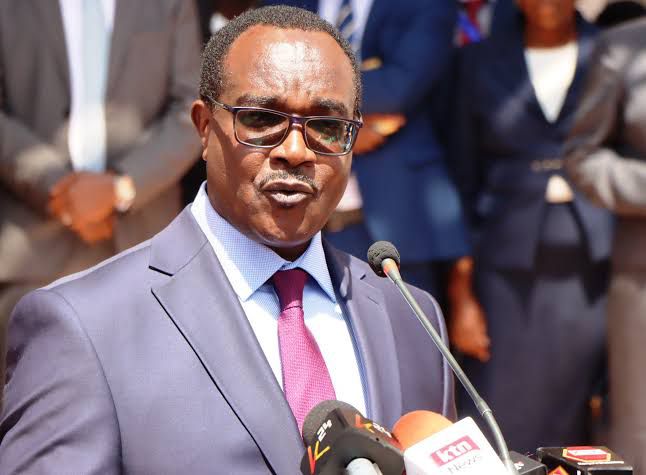400,000 students in poorly-run universities face uncertainty
What you need to know:
- Ogamba ascribed the failure to political patronage and ethnic considerations during appointments.
- The Cabinet Secretary stated that appointments to councils will henceforth be subject to security background checks.
More than 400,000 students, or 60 percent of the total enrollment in public universities, are attending institutions that are inadequately governed, as reported by a parliamentary committee.
Education Cabinet Secretary Migos Ogamba informed the National Assembly’s Public Investments Committee on Governance and Education that 21 out of the 43 universities in Kenya are underperforming in terms of management.
He attributed the underperformance to political patronage and ethnic considerations during the appointment of Vice Chancellors and Council Members within the higher education institutions.
Mr. Ogamba conveyed to the National Assembly’s Public Investments Committee on Governance and Education, chaired by Bumula MP Wanami Wamboka, that 20 universities are performing well while 21 are experiencing difficulties due to governance concerns and political patronage.
“The 21 non-performing universities encompass more than 60 percent, or 400,000 of the total enrollment of 800,000 students,” Mr. Ogamba stated.
“If we were to eliminate these 21 universities as proposed by the member for Imenti Central (Moses Kirima), what would we do with the students enrolled in those institutions? ” Mr. Ogamba inquired.
Mr. Kirima had insisted that the unprofitable universities be closed and students reassigned to other well-performing institutions.
Mr. Ogamba informed the committee, led by Mr. Wamboka on Friday, April 25, 2025, that the Ministry has initiated measures to ensure that candidates for council appointments will be subject to security background checks by relevant authorities to assess their appropriateness.
Mr. Ogamba remarked that the Ministry is revising the qualifications of all University Councils with the aim of ensuring that all members are competent to oversee the higher education facilities.
“Out of the 43 universities, 21 are facing challenges. We have refrained from appointing Council Members for several universities because we want to assure their qualifications. We are currently conducting background checks on prospective council members. ”
“Members of the University Council must undergo background checks prior to their appointment. We are presently evaluating six councils. It is vital for the committee to note that 21 out of the 43 university councils are experiencing difficulties. ”
Mr. Ogamba appeared before the committee to address various issues related to the auditing of public universities and the Technical Vocational Education Training (TVET) regarding the non-remittance of statutory deductions, operation without Governing Councils, stalled projects, rejection of Vice-Chancellors upon return from leave, ethnic and gender balance in staffing and appointments, and officers in acting positions for over six months.
Auditor General Nancy Gathungu had raised concerns about the failure of several universities to operate with Governing Councils, as well as issues related to ethnic and gender balance in staffing and appointments.
The Cabinet Secretary informed the MPs that the slow process of appointing vice chancellors and councils has been necessitated by the necessity to ensure that qualified individuals are appointed to the vacant positions.
“The issues afflicting our institutions of higher education have arisen from political patronage or governance challenges. We are currently conducting background checks to ascertain who oversees our institutions of higher learning,” Mr. Ogamba stated.
“In the appointment of university councils and boards of TVET institutions, we endeavor to comply with the provisions of the Constitution regarding fairness, regional and gender balance, merit, and competition,” Mr. Ogamba informed MPs that the councils and boards assume strategic oversight roles in the administration of institutions, which are responsible for policy formulation, strategic direction, financial oversight, and institutional accountability.
“It is, therefore, crucial to appoint the right individuals, possessing the appropriate skills mix, and to do so in a manner that is compliant with legal requirements,” Mr. Ogamba articulated.
“At present, the majority of our university councils are fully constituted. Only six public universities have vacancies ranging from two to three members. The remaining councils are either fully constituted or have only one member missing,” he noted.
“The vacancies remain unfilled due to the recruitment process currently underway, aimed at securing the right skills mix, as well as gender and ethnic balance. We will address these vacancies once the ongoing recruitment process concludes. ”
He indicated that once the Public Service Commission (PSC) finalizes the recruitment processes, the results will be submitted to the university councils, which will then engage in consultations with the Cabinet Secretary prior to making any appointments.
Mr. Ogamba emphasized that crucial consultations, aside from merit, include considerations of gender and regional balance to ensure that senior management appointments accurately reflect the diversity of Kenya and promote gender inclusivity.
